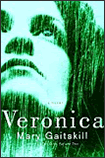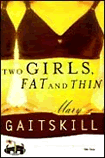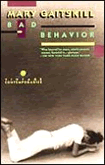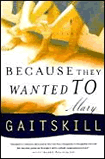Mary Gaitskill
posted Jan 9, 2006
Over the past eighteen years, Mary Gaitskill has a built an impressive body of work, featuring plots and prose that are at once brutal and beautiful. We recently had the chance to catch up with her by email, to ask about her approach to her craft, her latest novel, Veronica, and her recent National Book Award nomination.
| * * |
You wrote Veronica over a period of ten years.
I didn’t actually write it over ten years. I wrote a draft in '93 and then tried unsuccessfully to revise it in '94. After about thirty pages I realized that I did not have the right voice for the novel and put it aside to work on the stories that became Because They Wanted To. For the next seven years I periodically took it out and looked at it; it wasn’t until 2001 that I suddenly felt I understood something about it. Even then it was a very unsure understanding; it was pure intuition and mainly had to do with finding the right voice, or form.
Did your vision for the novel change as your life changed over these years?
No, it really didn’t. The vision was very much the same, but in the beginning it was very crude, nearly inarticulate. It was there in terms of feelings and even ideas, but none of it had reached the word level. That sounds like a strange thing to say because I did write a draft of it, so I did put it into words. But the words I used then were not adequate to represent what I felt and saw with my inner eyes. A major (and so far unnoticed theme) in the novel is form vs. formlessness; that theme is mirrored by what I’m saying. My vision was there in a natural, inchoate state that was invisible to others and even to my own rational mind. I had to find the words to give it form.
Why do some writers produce a book every two years, while others take much longer?
I have no idea.
Does your writing process differ when writing short stories and novels?
My writing process differs with everything I write.
Do you prefer one form to the other?
For awhile I was more drawn to short stories. I am finding myself more drawn to novels than previously. The choice of form very much depends on the content.
Veronica’s narrative focuses on a single day in the life of your protagonist, the ex-model Alison. But the story covers decades. Did you mean from the start to give your novel this hybrid structure, or did it emerge as you edited and rewrote?
The structure became more complex when I went back into it in 2001. I always intended it to take place over the span of a day, but in the original version, the back-story covered only a few years, not decades.
Can you describe your writing routine? Do you write daily? How long is your typical writing session? What about your revision process—do you write first drafts quickly, then revise painstakingly?
I don’t have a routine, or rather I acquire a new one every time I start something, or even each time I start a section. I don’t write daily most of the time. However, if I have a chunk of time free and am clear in my mind what I’m working towards, I do write every day until I’m finished or have come to the end of my time or understanding—for the moment. My typical writing session is two to four hours long. Usually if I write two hours, say in the early afternoon, I’ll sit down again in the evening and write another two to three hours. The longest I’ve ever written at a time is 6 hours—but that is unusual. I usually spend a lot of time on drafts and then revise painstakingly. Though sometimes the revision doesn’t take long because I do spend such a long time on the draft process. In the case of Veronica it was the reverse—the first draft was very quick and rough and only took about a year. The second draft took three years, plus another six months for revisions.
How do you balance teaching and writing?
I don’t!
You published your first book of fiction in 1988. How has your experience with the publishing industry, and your view of it, changed over the last seventeen years?
I have the impression that it has changed quite a bit, though that is really just an impression. I pay very little attention to the industry side of things, so I can’t have more than an impression. My impression is that there is more desperation, uncertainty and almost no patience.
Your protagonist Alison and her friend Veronica seem an unlikely pair—the former a habituée of the world of fashion and fame, the latter a thrumpy wisecracker who spends her day behind a desk. Why did you decide to have Alison tell Veronica's story, rather than having Veronica tell it?
It wasn’t a conscious decision. I just never saw it any other way.
You've lived in New York City, San Francisco, Toronto, and Houston. Does the place you’re living influence your writing?
It may, in some very abstract way. I did notice that when I was writing Veronica I tended to prefer gentle environments, whereas in the case of the new novel I’m working on—which I started in 2000—I have tended to prefer cacophonous city environments. Though the preference isn’t strong—when it comes to writing, the internal world is much more important than the external world.
Are some places better for writers than others?
Writers are all different, so the better place for one will not be the better place for another.
What was your reaction to Veronica being nominated for a National Book Award?
I was very surprised, shocked really. Mostly because when I got the message, the book had not even been published yet. I said, how could that be, it's not come out yet? He, a gentleman named Harold Augenbraum, told me that they’d read it in galleys.
How were you notified—did Ed McMahon come to your door?
I received an email from the National Book Foundation asking only that I contact them ASAP. I thought they were going to ask me to be on a committee.
Have you read the works of your fellow nominees?
I’m sorry to say that I have not.
You once described the film adaptation of your story "The Secretary" as the Pretty Woman version, heavy on the charm (and a little too nice)." Do you worry that Veronica might one day be similarly Hollywoodized?
I can’t imagine worrying about something like that. In the worst case scenario I would neither be hurt nor helped—except for the money, which is always a help. In the best case scenario, I (and the book) would be helped a great deal. There is much middle ground—Secretary was definitely a middle ground-type situation—but bottom line is that if it’s made you get some money and exposure, and people can make up their minds from there. I don’t see anything to worry about.
© 2006 failbetter LLC · all rights reserved











